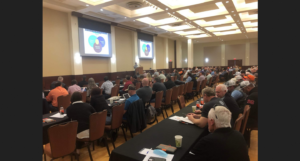Final report for SOK21-001
Project Information
The OkSARE PDP strives to promote an exemplary level of cooperation between Langston University and Oklahoma State University to further the sustainability of Oklahoma agriculture by promoting the adoption of viable economic practices, responsible environmental resource management and the recognition of social responsibility in Oklahoma. This Plan of Work builds upon and extends prior programming efforts wherever possible. The goal of the program is to integrate and increase sustainable agricultural practices in historically mainstream agricultural endeavors as well as the emerging significant urban/suburban interface of our state while enhancing the quality of our natural resources and the rural way of life. Objectives remain to train agricultural professionals (Land Grant, federal/state agencies, and NGOs) and mentor farmers in the concepts and best management practices of sustainable agriculture as well as disseminating information regarding sustainable agriculture through various outlets. We recognize that the fundamentals of our focus do not greatly change over time. They include Crop Production, Small Acreage Programming, Vegetable Production, Local Food Systems, Livestock Production, Farm and Ranch Management, Drought, Weather, and Water Issues along with a new topic, Disaster and Emergency Preparedness. Training will be provided as allowed and deemed safe via participation at national, regional and local workshops and trainings, demonstrations, tours, research presentations, online and small group in-service trainings. Evaluation will be conducted on an on-going basis and feedback on the effectiveness of these various trainings and programs will be tracked and reported.
1.) Sustainable Crop Production concepts which may include cover cropping, crop rotations, irrigation practices and pesticide/herbicide use will be included in programing for/by at least ninety agricultural educators. a) In 2020, the training provided to these educators were offered through the OSU Winter Crop School, the Panhandle Crops Clinic, the Red River Farming Conference and Regional Farming and Small Grains Conferences which were held virtually in Oklahoma. b) In 2021, if pandemic conditions permit, OSU will offer a Master Irrigators Training to be held in February to a limited number of attendees in a face-to-face multi day training. The OSU Winter Crop School, Red River Farming Conference and various Small Grains Cropping Systems meetings will be scheduled as allowable.
2.) That fifty agriculture professionals will be able to provide information, education and guidance on Small Acreage Programs. a) In 2020, several of the programs historically supported by the OkSARE PDP were cancelled due to the COVID-19 Pandemic. We have taken this opportunity to explore expanding the programming through our participation in an Agriculture and Natural Resource Team which has been established to provide a focused approach to topics of interest to the small scale producer. b.) In 2021, A new program which has been proposed as a direct result of Educator participation in a previous SSAWG Conference will be a series of inservice training sites to be established to train Educators and Producers in the hands on production and management of honey bee colonies to support pollinators and provide new and alternative products for producers in our state. Additionally, a program to cover the basics of backyard poultry keeping is planned to encourage responsible management of poultry on small acreage farms. Other topics which are scheduled to be addressed for the small producer are forage production/stocking rates, hay storage, fruit and vegetable production for beginners (Organic and Conventional), food preservation methods and disaster/emergency preparedness. OkSARE will, as always, be providing significant support for the Langston University Annual Goat Conference in addition to the a fore mentioned trainings.
3.) Twenty educators would receive training on Local Food Systems. a) In 2021, the ANR Team has proposed trainings on the following topics to be developed: Direct Marketing considerations for fruit/vegetable producers, designing a Small Scale Farm Operation curriculum for Educators/Producers, a clearinghouse for community garden information, health department regulations (FSMA, hydroponics, aquaculture, etc.) and strategies to alleviate food insecurity.
4.) Eighty agricultural professionals will be able to provide the latest information with respect to the environmentally sound management of natural resources - especially water, soil and air, particularly as they are affected by Drought, Weather and Water issues. a) Specific topics that have been addressed to meet these needs are: Droughts preparedness and response, Pond Management, Water Conservation and Crop Efficiency, Weather Extremes, the development of a comprehensive water plan. b) In 2021, these issues will be addressed through the OSU Winter Crop School, the Panhandle Crops Clinic, the Red River Crop School, and the Oklahoma Irrigation Conference.
5.) Twenty extension educators would be better prepared to assist and provide technical direction for producer driven research and on-farm demonstration activities through producer program granting opportunities such as the USDA and SARE. a) In 2021, this will continue to be encouraged through the distribution of Educator Kits containing information with respect to the SARE, ODAFF and USDA granting programs.
6.) Fifty educators and others will receive training in Farm and Ranch Management covering topics such as analyzing production costs, transition and estate planning, marketing and cash futures, finance programming and USDA programs and the farm bill to subsequently help producers in developing and sustaining their operations. a) In 2021, this will be accomplished with previous mentioned programming by sponsoring sessions covering these topics at the Red River Farming Conference, the OSU Winter Crop School, the Master Irrigator's Program and online trainings.
7.) Sixty professionals will be trained in sustainable alternative livestock practices to cover analyzing feed costs and supplements in a production system, marketing, reproduction and herd health and other biosecurity concerns. a) In 2021, this will continue to be addressed through the Oklahoma State University Meat Goat Boot Camp and the Langston University Goat Conference programs as well as rotational grazing presentations at the Red River Crop School and the OSU Winter Crop School. We will also work closely with coordinators of a recently funded NIFA Sustainable Ag systems Grant entitled “ Enhancing livestock production from rangelands in the great plains” to facilitate training on multi-species patch burn grazing strategies.
Advisors
- (Educator)
- (Educator and Researcher)
- (Educator and Researcher)
- (Educator and Researcher)
- (Educator and Researcher)
- (Educator and Researcher)
- (Educator)
- (Educator and Researcher)
- (Educator and Researcher)
- (Educator and Researcher)
- (Educator and Researcher)
- (Educator and Researcher)
- (Educator and Researcher)
- (Educator and Researcher)
- (Educator and Researcher)
- (Educator)
- (Educator and Researcher)
- (Educator)
- (Educator and Researcher)
- (Educator and Researcher)
- (Educator and Researcher)
- (Educator)
- (Educator)
- (Educator)
- (Educator and Researcher)
Education
The activities outlined herein that were supported by the Oklahoma Sustainable Agriculture Research and Education Professional Development Program seemed to embrace a return to "normal." The most widely used was a directed teaching format. This format involves a designated speaker (or panel) presenting information to a group of attendees. This format is utilized in both a classroom setting and a tour/field setting. In both, the speaker (or instructor) discusses data supported by examples (photos, graphs, charts or actual physical specimens) to explain a concept. Experience (and attendee feedback) continues to indicate that the audience tends to gain more understanding when physical specimens are presented. This is why short courses, small groups and field tours tend to be very appreciated by our agricultural professionals. “Hands on” type learning is generally more effective for us versus a “theory only” program. Many of our program offerings also included an online format to accommodate those who couldn't travel or were still more comfortable with limiting public interactions. Most of these meetings utilized Zoom, YouTube and podcasts. It should be noted that accommodations were made for meetings held under controlled conditions. Arrangements were made to provide ppe in the form of masks, sanitizing products, individual sets of educational materials, and social distancing (indoors and outdoors) as attendees requested. As there were plenty of opportunities for electronic instruction, the OkSARE PDP continued a previous training initiative to encourage the establishment of a series of demonstrations at the county and area level. These outdoor locations provided an outlet for producers to tour/visit on their own schedule and acquire printed handouts reinforcing the concepts covered by the demonstration. Our program participants have also expressed appreciation for the Southern SARE printed publications which we continue to make available free of charge through the auspices of the Southern SARE office.
Education & Outreach Initiatives
Sustainable Crop Production concepts which may include cover cropping, crop rotations, irrigation practices and pesticide/herbicide/fertilizer use will be included in programming for/by at least ninety agricultural educators
In 2021, this objective was met with the following trainings:
- In July, the New Educator Field Institute was held in Perkins, Oklahoma. It was attended by 25.
- The Organic Cover Crop Demonstration was continued through the 2021 growing season at the Lane Research Station.
- Additionally, the OkSARE team has championed the development of a new research and demonstration farm. The McCaull Research and Demonstration farm highlights ongoing efforts in precision irrigation and nitrogen management as well as provides an outlet for technology providers to discuss their products.
- The OSU Winter Crops School was held in December in Stillwater, Oklahoma. There were 140 in-person participants plus 50 virtual registrants.
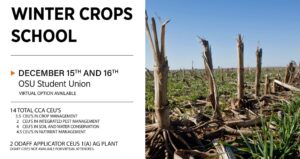
- In February, the Master Irrigators Conference was held in Altus, Oklahoma. This training consists of four sessions over a four week period and is limited to 25 participants.
- In August, a Canola Production and Private Pesticide Applicators training was held in Garfield County for 48 registrants.
- In September, The Annual RAIN meeting was held. Seventy-five people were present.
- In October, a virtual Soil Health Initiative meeting was held with representatives all across the Southern Great Plains.
The learning and action outcomes and impacts of these initiatives are as follows:
1. The New Educator Field Institute was a hands-on field driven training conducted on the Cimarron Research Station. The topics presented were: Soil Pit and Soil Properties, Plant ID Basics, What are growing degree days?, Selecting for Herbicide Resistance, Fertilizer Sources, Stand Counts, Plant/Water Interaction, General discussion and topics of concern.
2. The Organic Cover Crop Demonstration that has been established at the Lane Research Station is used for Educator trainings in the Southeastern Oklahoma Area. This will be the final year of this multi year demonstration.
3. At the McCaull Research and Demonstration Farm, a field day program has been developed to encourage both public and private events and has been successful in attracting approximately 80 attendees, this is substantial in this sparsely populated region of Oklahoma.
4. The OSU Winter Crops School was a two day event featuring speakers from across the U.S. who presented information on critical management strategies for the plains cropping and range land production systems.
5. The Master Irrigators Conference covered the following topics: Aquifers and surface water in SW Oklahoma, Water Rights and Regulations, Water Quality, Soil Moisture Sensors, Moisture sensors, (consultant perspective), Pumps, VRI, pump efficiency with recharge and depletion of the aquifers, the Oklahoma Mesonet, Irrigation with Limited Water, Soil Moisture and Canopy Temperature, Drones: Applications in Agriculture, Irrigation Scheduling Models and Telemetry. Completion of this program ensures that an individual has received in-depth training on appropriate water use practices.
6. Understanding tillage for canola production was presented at the Garfield County Canola and private pesticide applicators training meeting.
7. Update on our Aggregate Stability Analysis Protocol and Conservation Tillage Studies was presented at the annual RAIN project meeting.
8. Transitioning from conventional tillage to strip-till and/or no-till: Timing and climate was presented during the virtual soil health meeting.
That fifty agriculture professionals will be able to provide information, education and guidance on Small Acreage Programs including vegetable gardening, livestock production and value-added products
1. In 2021, a new program was developed as a direct result of Educator participation in a previous OkSARE sponsored ravel to attend the SSAWG Conference has been a series of inservice training sites established to train Educators and Producers with hands-on experiences in the production/management of honey bee colonies to support pollinators and provide new and alternative products for producers.
2. An additional program was proposed to cover the basics of backyard poultry keeping. However, due to the recent Avian Influenza concerns, this program will be pushed back to possibly the next calendar year depending on the outcome of this latest poultry disease outbreak.
3. The Horticulture Industries Show was held in Fayetteville, AR in January. There were 100+ people in attendance at this two day event.
3. Other trainings which have been addressed for small scale producers cover forage production, livestock stocking rates, fruit and vegetable production, food preservation and disaster/emergency preparedness.
- The OkSARE PDP Honeybee Project has now entered it's second year. The 2020-21 cycle was primarily spent establishing the hives and training the Educators at each location in the proper handling and management of the hive and related equipment. Monthly Zoom meetings were held to discuss progress and allow each participant to ask questions and share information. Several site visits were conducted to reinforce the establishment and provide support and supplies. The following is the synopsis of the OkSARE PDP Honeybee Project for Educator Training:
In the spring of 2021 eight hives were placed across Oklahoma. Those locations were Enid (2), Hobart, Walters, Ada, Kellyville, Tahlequah and Oklahoma City. Each hive was started with a 5 frame Nuc (short for Nucleus). Hives were placed with 7 educators. Two of which had previous bee experience and the other five had none. The following is a report on those hives progress and activities.
When the hives were started each educator fed the hive for remainder of the spring and into summer with sugar water.
Two of the hives (Walters and Tahlequah) swarmed and left the hives. This left the hives empty. A third hive (Ada) attempted to swarm but was caught in time by the educator and this was prevented.
There were no problems with mites or other pests in any of the hives.
Of the eight hives only one (Kellyville) produced enough honey to be harvested. Ten 1-pound jars were produced from that one hive. None of the harvesting equipment was used in 2021.
Two of the educators (Ada and Hobart) went out and caught wild swarms and started another bee hive of their own.
The Tahlequah hive has been moved to Stillwell under the supervision of the educator there. Attempts are being made to restart that hive with a new Nuc.
The Walters hive has plans to start again with a new Nuc.
All remaining bee hives were fed and shut up for winter.
2022 has been off to a slow start. Drought and a late start to the growing season has nectar flow slow. Feeding sugar water is continuing. The Ada hive attempted to swarm again. This hive may need to be re-queened. Hopes are high that honey production will be up in 2022.
Producer Meetings
One producer meeting was held in Kellyville using the hive there as a demonstration model. Another is planned for April 29 in Oklahoma City. The Oklahoma County producer meeting has been cancelled due to the discovery of hive demise at that hive location. The hive will be re-stocked if a replacement can be found at this late date for the bees.
- The Langston University Small Farms Program has continued to operate across the state. OkSARE has provided planning and educational materials for both the tribal workshops and the plasticulture and market garden trainings. It is quite important to note that Langston University is in the mid stages of building a new horticulture teaching facility. This facility will provide a state of the art location for small farms trainings in horticulture.
- The Oklahoma Local Ag Summit 2022 was held in March in Broken Arrow, Oklahoma. This was a two day event attended by over 180 registrants. This training featured a full day Best Farm Practices Workshop, a Marketing Workshop, 20 different breakout session covering issues of interest to small scale producers including fruit and vegetable production, food preservation, disaster/emergency preparedness, business planning and community food security.
Twenty educators would receive training on Local Food Systems and fifty educators will receive training in Farm and Ranch Management
- In 2021, The OSU Women in Ag and Small Business Conference was entitled "Empowering Women in Rural America." It was held in August in Oklahoma City.
- The Cherokee Food Sovereignty Initiative was held online in July of 2021.
- The Oklahoma Extension Biannual Conference was held in January in Stillwater, Oklahoma. This three day even was attended by 140 Extension professional from the 1862, 1890 and 1994 institutions in Oklahoma.
- Please see above for a discussion of the 2022 Horticulture Industries Show and 2022 Local Ag Summit.
The learning and action outcomes and impacts of these initiatives are as follows:
- The Women in Ag and Small Business Conference was attended by 120+ registrants. The event was held over two days. The keynote speakers were Michele Payn "Take Food Bullying by the Horns" and Amanda Radke "Multi generational Family Agriculture Businesses." Topics covered by individual sessions included: Animal Disease Traceability, Considerations for Setting Up Your Business, Marketing Strategies for Local Foods, Mental Health and Stress, Livestock Feeding Programs, Understanding Cottage Laws and Onsite Processing, Branding Your Marketing Story Grant and Loan Resources, Soil Health and Land Stewardship, Multi-use Farming, Making Smart Money Decision, Beef Production and Sales, Dealing with Covid-19 Agriculture Cattle and Commodity Markets, Using Sheep and Goat for Pasture Management and Alternative Income, Considerations for Taxes during a Covid Financial World, Navigating Financial Issues in a Diversified Agriculture Operation, Calving Simulator, Extending Growing with Hydroponics, Ag Policy, Incorporating Paper Planning to Digital Life, Small Poultry Operations, Free Farm Financial Planning Resources, Navigating County, State and Federal Resources.
- The Cherokee Food Sovereignty Initiative included several presentations discussing the Research and Education activities of Southern SARE and the granting opportunities available through it's many types of programs. This information was presented by the OkSARE State Program Assistant.
- The 2022 Oklahoma Biannual Extension Conference provided many different information sessions and opportunities for networking and sharing between the three land grant institutions in Oklahoma.
That sixty professionals will be trained in sustainable alternative livestock practices to cover analyzing feed costs and supplement in a production system, marketing, reproduction, herd health and other biosecurity concerns.
- The 2021 OSU Meat Goat Boot Camp was held in Ada, Oklahoma in October. This training is a three day event open to 50 Educators and Producers.
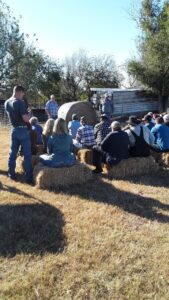
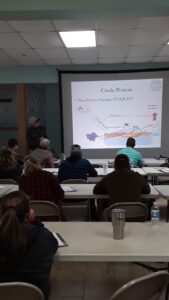
- The 2022 Langston University Goat and Hair Sheep Field Day was held in April in Langston, Oklahoma. The theme was "Back to Basics - Innovative and Sustainable Management." It was attended by 110+ registrants.
The 2021 OSU Meat Goat Boot Camp reported the following evaluation summary and impacts:
Participants
- There were 52 participants from 10 states representing Oklahoma, Texas, Missouri, Alabama, Arkansas, Georgia, Minnesota, Pennsylvania, Tennessee, and Kansas.
Goat Herd size and Value of Goat Camp
- The average herd size was 89.
- Herd size ranged from 15 to over 500
Each participant was asked to place a value of the education and skills learned at the goat camp. Below is their response.
- Total value equals $818,724
- Five participants listed the value as priceless.
Session Rankings
Each participant was asked to indicate the knowledge learned from each session during the boot camp. A five point scoring system was used were 1 = no knowledge gained and 5 = great deal of knowledge gained. Below are the results.
- Average score for all 22 sessions was 4.57.
- Session scores ranged from 4.13 to 4.72
- Top five sessions were:
- Hoof Trimming and Aging – 4.72
- FAMACHA – 4.72
- Fecal Egg Count Demo - 4.72
- Parasite De-Wormers Resistance and Eye Scores - 4.68
- Parasite Life Cycle Management - 4.68
Adoption of New Skills
Participants were asked if they planned to adopt any of the practices taught during the 20 sessions. The average adoption rate for all sessions was 79.4%. Across all sessions, the range of planned adoption was 56% to 92%.
Pre and Post Test Score Results
Methodology
In an attempt to measure the amount of knowledge gained during the Oklahoma Meat Goat Boot Camp, a 30 question test multiple choice/true-false test was developed by the instructors of the Boot Camp. Each question was taken from the material being presented at the Boot Camp. This test was then given to each participant at the beginning and the end of the Boot Camp. The following are the results:
Results
Test Average Score Range % Correct
Pre-Test 17.5 11-24 58.5%
Post-Test 23.0 15-30 76.7%
The results show that participants improved their test scores by 31.2%.
Further, we can group the 30 questions into 7 areas of production and management. Then we can look at the test scores to determine which areas the group were the most and least knowledgeable before the Boot Camp and which areas had the biggest improvement in knowledge gained. The seven areas are as follows:
- Parasite Management and Control
- Record Keeping
- General Herd Management including Herd Health
- Herd Nutrition
- Forages and Forage Production Systems
- Marketing
- Business Planning
Test Results
% Correct
Group Pre-Test Post-Test % Change
- Parasite 70.8% 89.8% 26.8%
- Record Keeping 85.6% 78.4% -8.3%
- Herd Mgmt 75.2% 90.2% 19.9%
- Nutrition 27.4% 49.5% 80.7%
- Forages 55.0% 78.8% 43.3%
- Marketing 50.6% 81.7% 61.3%
- Business Planning 36.5% 50.0% 36.8%
Comments made by participants on camp evaluations.
- This is an excellent resource and am thankful that this is available for us. A lot of information is covered and it is great that we can then know where to go to get questions answered. Would highly recommend this to someone that wants to learn or is a serious goat business planner.
- This class was very informative
- The food was awesome. The program was great. Farm tour was awesome.
- Very good program. Wish I had come here prior to starting goats.
- Really impressed with the course. Worth much more than $150. Plan to take again in 2-3 years. Thanks for a quality program.
- The info presented is virtually the same as the you tube videos that I already watched, so a lot of the first day info was not very beneficial. Food was great! Thanks for taking such good care of us.
- While the instructor was definitely an expert in forage production, the workshop was a little frustrating because my group did not really participate. They were talking about other things. I did not even know the basics, like what time of year the certain grasses grow so even a more basic overview of grass types and identification of grasses may have been helpful. That is the only thing, otherwise it was an amazing experience and I learned a lot! Made great connections and am thankful for this workshop!!
- Thought this camp was excellent! Learned something in every session. Let me know when you have an Advanced Goat Camp.
- Y’all did a fabulous job! I really appreciated all the hard work and providing the meals was very generous as well and took a lot of stress off! I would highly recommend this to anyone thinking of getting goats or who may have them.
- Thanks for all the wonderful advice and food!!
- Break (5 min) in between sessions would be helpful!! Overall, great boot camp. Thank you! Great job!
- Great job, really enjoyed it and learned a lot. If I had to pick something I’d say probably add more real life scenarios rather than from a scientific stand point. But overall very helpful. Appreciate all of you and the knowledge that I have gained.
- I would suggest having a full 3rd day instead of a long 2nd day.
- I enjoyed everything. It was definitely worth the $150. The food was also great.
- Great course. Some things I already knew but had the chance to ask some questions. Dehorning might be something that could be helpful, something similar to the birthing exercise we had.
- Excellent program, 5 stars
- Great educational opportunity! I wished I had did it prior to getting involved in goats! I love how the extension offices all work together and put on a very great program! I hope that it continues to grow as more and more folks get into goats. I wished the state of Kansas extensions were this great! Fabulous Job!
- The farm tour was the most valuable part of the program. Would like to see a demonstration about selecting a good buck and how often to replace. More session on the forage piece. Maybe have producers bring what they have to look at with agronomist. Flash drives with all the computer tools. Allow us to download or give to us.
- Good job!!
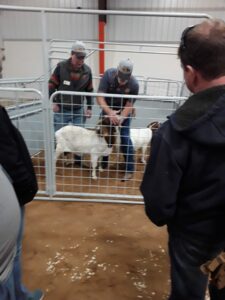
OSU Meat Goat Boot Camp instruction using live animals to learn about body condition scoring and FAMACHA.
2. The 2022 Langston University Goat and Hair Sheep Field Day covered the following topics: Basics of Marketing and Processing, Nutrition with LINC, Enterprise Analysis, Cooking Tips, Facilities, Basic Herd Health, Goat Identification, Hoof Trimming, FAMACHA, and Body Condition Scoring.
Educational & Outreach Activities
Participation Summary:
Learning Outcomes
Project Outcomes
Face of SARE
The demographics of the participants of the OkSARE PDP varies from program to program. When a training is identified as meeting one of our identified subject areas and objectives, the OkSARE cooperators will meet with the planning group of the event to determine how the OkSARE PDP may assist with their program. This participation can and does take several forms: a speaker/session may be developed and supported, travel scholarships may be offered for Educators and mentor farmers, administrative services may be performed by the state program assistant to facilitate the training, educational materials may be produced and distributed in support of the event. As demonstrated previously in this report, the OkSARE PDP takes an active role in various programs which are identified by the members of our Advisory Committee within their specialized focus groups. Our efforts have proven very successful in meeting the objectives which are targeted specifically to those program area topics as dictated by this same Advisory Committee. This keeps the scope of the OkSARE PDP varied and helps the programming to be both diverse and inclusive of the various areas of interest to our cooperators. The information and results from SARE activities is distributed and promoted through announcements, field days, presentations at conferences and other appropriate events. Fact sheets, production manuals and handbooks have historically been generated as a direct result of this work. These materials are then posted on our mobile print-on-demand (PODS) website sponsored by the Oklahoma County Extension Service. Announcements are sent out to all extension personnel when new materials are ready for distribution on a weekly basis and the Educators may then request copies of these products. One of the most efficient and popular methods for assimilating information regarding OkSARE cooperative trainings has been the use of social media. Various cooperators maintain Twitter, Instagram, YouTube and Facebook pages where announcements are routinely sent out with links back to program information and pertinent materials. If funding permits, these materials are printed and distributed to target audiences at sustainable agriculture events such as the Master Irrigators Training and the OSU Winter Crop School. Southern SARE provided materials are also made available to all new Educators and presented for distribution at targeted meetings through the state.
